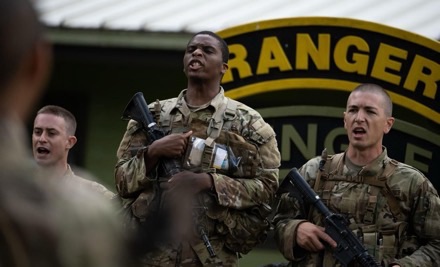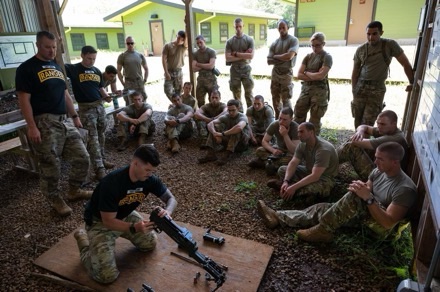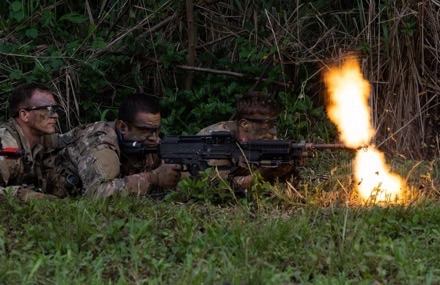Want to go to Ranger School?

JOINT BASE SAN ANTONIO-LACKLAND, Texas (AFNS) —
It’s been called “a laboratory of human endurance,” testing the physical, mental and spiritual grit of the officer and enlisted leaders who undertake it. It’s the Army Ranger School and the Department of the Air Force is looking for Airmen and Guardians who are ready for the challenge.
Through the Air Force Security Forces Center’s Ranger Assessment Course, DAF candidates are taught, coached, tested and evaluated for nomination to the grueling 62-day Ranger School experience.
“The Air Force RAC delivers dynamic leadership evaluation and training, mirroring what a candidate will face at Ranger School, which helps drive increased success rates at Army Ranger School. Attendance to both courses ties directly into the Air Force chief of staff’s priority of strengthening joint leaders and teams by directly placing them in joint leadership school and roles which have proven to build military leaders,” said Gabriel Rodriguez, readiness training and RAC program manager at the AFSFC.
The next RAC, about a third of the length of Ranger School, is set for early spring at Joint Base San Antonio-Camp Bullis. Anyone from any Air Force or Space Force career field can attend.

“While the majority of Ranger School attendees come from combat arms career fields, individuals from other Air Force specialty codes can also attend if they meet the necessary prerequisites and requirements,” Rodriguez said. “Ranger School can provide valuable leadership and tactical skills, regardless of the individual’s primary AFSC.”
One of the many misconceptions of the RAC and Ranger School is “that you must be 100% ready before you even attend the course – but that’s where most people are wrong,” said Master Sgt. Keegan Donnelly, RAC instructor with the AFSFC.
The RAC curriculum has undergone an intense review and rewrite to craft a leadership laboratory, he said, designed to teach and coach students before assessing their abilities.
Capt. Daniel Reynolds, assistant director of operations for the 4th Test and Evaluation Squadron, Peterson Space Force Base, Colorado, is the only Space Force Ranger School graduate to date. In his position, he interacts with tactical joint force warfighters on a daily basis to develop more resilient satellite communications toolkits. That warfighter-centric focus in his day-to-day job is what led him to the RAC and ultimately Ranger School.
“Ranger School, as the world’s premiere combat leadership course, expertly teaches resilience, grit and perseverance in the face of overwhelming odds,” Reynolds said. “It teaches leaders how to break down complex problems and craft decisive solutions to dynamic combat scenarios. This is incredibly relevant to any career field in any branch of military service.”
According to its website, Ranger School is a small unit tactics and leadership course that develops functional skills directly related to missions that engage the enemy in close combat and direct fire battles. It’s held at various locations in Georgia and Florida and is open to U.S. military members from all branches, as well as selected students from U.S. allied nations.
With less than 40% of those who attempt Ranger School succeeding, the Air Force developed a form of RAC, or pre-Ranger training, in the mid-1980s to send more competitive candidates forward to increase the odds of success.
Ranger students train to exhaustion, pushing the limits of their minds and bodies during three phases – Darby, Mountain and Swamp – which follow the crawl, walk, run training methodology, Rodriguez said.
With the punishing nature of Ranger School, preparation and an understanding of what attendees will encounter before they get to both the RAC and Ranger School is extremely important, he said.
“Candidates can increase their success at both RAC and Ranger School by focusing pre-training on being successful during the weeklong Ranger Assessment Phase,” Rodriguez said. “At RAC, we hone in on tasks that could hinder a candidate from being successful at Ranger School. This includes strictly executing push-ups, sustaining the mental and physical toughness to meet the time standard on the 12-mile foot march, and honing the basic navigation skills required to pass the land navigation test on the first attempt.
“A proven method to increase success at Ranger School is to take advantage of local training and attending RAC, then followed by Ranger School,” he added.
“The bar to gain acceptance to Ranger School is high, and rightfully so,” Reynolds said. “RAC allows prospective students to understand what will be expected of them if they accept the challenge to attend Ranger School. It also provides them with the tactical skillset necessary to be successful there, both in the assessment phase and in the course’s three patrolling phases.
“Developing Ranger-qualified leaders within the Space Force is critical to our continued defense of the contested warfighting regime of space,” Reynolds said.
“Every career field has a need for decisive, brave, tough and purpose-driven leaders of character. To put it simply, learning how to lead is something that Ranger School does on a world-class level. This is an invaluable resource to have for any service member in any career field,” Reynolds said.
“The RAC and Ranger School were the catalysts for some of my life’s greatest transformations,” the captain said. “The experience transformed me into a much more confident, capable and purpose-driven human being and that has affected every aspect of my leadership development for the better.”
Airmen and Guardians who qualify to attend RAC, and ultimately the Army’s Ranger Course, should be prepared for the monumental experience, Reynolds added, with “feeling drawn to attend” being the most important component to possess in preparation for it.
“A significant proportion of people who fail the course do so because they arrived without deciding that the experience was something that their life needed,” the captain said. “Take the time to decide for yourself what your reasons for Ranger School are, and how important joining the community is to you. When you’re more cold, wet, tired and hungry than you’ve ever been in your life, those reasons will be what you will lean on to carry you through.”
“Regardless of their recommendation to move onto Ranger School or not, [RAC attendees] are still returning to their units better trained, more lethal and adaptable leaders in the joint arena,” Donnelly said.

To apply for RAC attendance or more information on the program, go to the Air Force Portal under Air Force Forces Generation Connect or email AFSFC.S3T.AFSFC_RAC_Program@us.af.mil.

